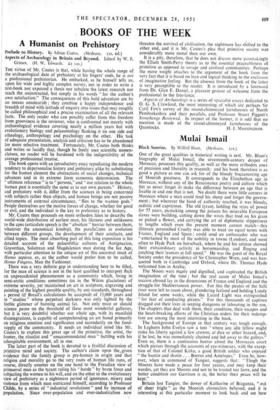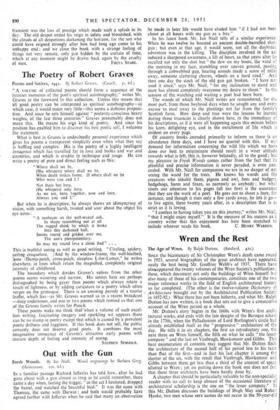Mulai Ismail Black Sunrise. By Wilfrid Blunt. (Methuen. 21s.) ONE
of the great qualities in historical writing is zest. Mr. Blunt's biography of Mulai Ismail, the seventeenth-century despot of Morocco, possesses this quality, as well as the more orthodox ones of precision and liberality in research: and his book therefore is as good a picture as one can ask for of the bloody buccaneering age of Moorish greatness. It corresponds to the Elizabethan age in Morocco, without any of the Renaissance poetry and culture which (let us never forget it) make the difference between an age that is livable in and one that is not. No doubt there were little corners in Morocco where a man could tend his sheep and forget the govern- ment; but wherever the hand of authority reached, it was bloody, sadistic and capricious. The old tyrant, holding the reins of power for 55 years, picnicking among the palaces his miserable European slaves were building, cutting down the wives that trod on his grass or picked a flower, and carrying the art of diplomatic slipperiness to lengths which even the present moment cannot match—this illiterate personified Cruelty was able to treat on equal terms with France, England and Spain ; could send an ambassador who was "entertained by most of the nobility in towne (London), and went often to Hyde Park on horseback, where he and his retinue showed their extraordinary activity in horsemanship, and flinging and catching their launces at full speed." He was the guest of the Royal Society under the presidency of Sir Christopher Wren, and was ban- queted both in Cambridge and Oxford, where Dr. Thomas Hyde welcomed him in Arabic.
The Moors were manly and dignified, and captivated the British imagination of the time • but the real cause of Mulai Ismail's success abroad lay in the dissensions of France and England and the struggle for Mediterranean power. For this the pirates of the Salli river were left to roam about, plundering Iceland and holding Lundy Island for some weeks, while the Lizard Light was extinguished "for fear of conducting pirates." For this thousands of captives dragged out their lives in seeping dungeons or labouring in the sun.. The chapters that deal with them, their condition, their escapes and the heart-breaking efforts of the Christian orders for their redemp- tion are among the most interesting in the book.
The background of Europe in that century was tough enough. In Leghorn John Evelyn saw a tent "where any idle fellow might stake his liberty against a few crowns, at dice or other hazard, and, if he lost, he was immediately chained and led away to the galleys." Even so, there is a continuous horror about the Moroccan court which pierces through the accounts of eye-witnesses, with the excep- tion of that of Colonel Kirke, a good British soldier who enjoyed "the huntin and shutin . Boores and Antelopes." Even he, how- ever, when- in command of Tangier, suggests that : " Thogh the Moores have made a peace for four yeares, and may keep their wordes, yet they are Moores and not to be trusted too farre, and the better condition our Garrison is in, the better their peace will be kept." Britain lost Tangier, the dower of Katharine of Braganza, "out of sheer fright" as the Moorish chroniclers believed, and it is interesting at this particular moment to look back and see how transient was the loss of prestige which made such a splash in its day. The old despot ended his reign in safety and bloodshed, with the clouds of all despotisms darkening the horizon, for the son who could have reigned strongly after him had long ago come to his unhappy end ; and we close the book with a strange feeling of things not very remote, only just hidden by the curtain of time, which at any moment might be drawn back again by the cruelty































 Previous page
Previous page